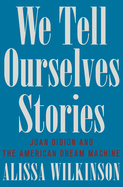
Here's an irresistibly fresh and provocative take on Joan Didion: film critic Alissa Wilkinson believes the writer "is perhaps best, or most fruitfully, understood through the lens of American mythmaking in Hollywood." Wilkinson makes the case in the trenchant and well-substantiated We Tell Ourselves Stories: Joan Didion and the American Dream Machine.
A fifth-generation Californian, Didion (1934-2021) grew up in Sacramento enamored of John Wayne--"the embodiment of the best possible outcome of her pioneer heritage, of the American myth," writes Wilkinson; Didion invoked Wayne in her first novel, 1963's Run River, and lionized him in a 1965 essay. As a young woman living in New York, Didion wrote film criticism for Vogue and National Review. In 1964, she and her husband, writer John Gregory Dunne, decided to give screenwriting a whirl and moved to Los Angeles, where they "sat at the center of Hollywood life," reports Wilkinson. The couple returned to New York in 1988, after which Didion largely trained her focus on politics, taking every opportunity to point out the performative aspect of being a politician.
Wilkinson (Salty) gives a gift to Didionophiles by lingering on a pre-fame Didion's underscrutinized film criticism. (It shouldn't surprise readers that her tastes didn't run toward the experimental.) We Tell Ourselves Stories provides yet another service: it tracks Didion's evolving politics across her lifetime. Wilkinson notes that it was Didion's disgust with Republicans' embrace of Hollywood actor turned politician Ronald Reagan that made her switch political parties--still another way that Tinseltown helped refine her thinking. --Nell Beram, author and freelance writer

